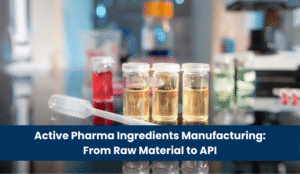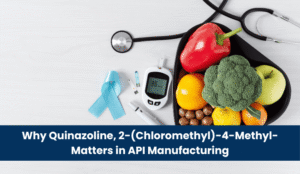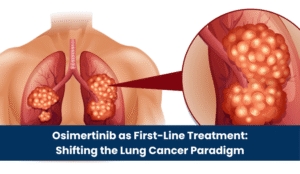Selecting an Active Pharmaceutical Ingredient (API) supplier is crucial in the pharmaceutical industry. This process is not limited to buying ingredients; it also means guaranteeing the product does its job, is safe, and meets standards. As the country plays a major role in making pharmaceutical products worldwide, this decision matters even more to Indian companies.
Selecting a supplier who aligns with your quality standards, regulatory requirements, and operational needs is essential.
This blog explores the major factors to consider when selecting an API supplier, emphasising the delicate balance between quality and cost.
Why Choosing the Right API Supplier Matters
APIs are the major components that give medications their therapeutic effects. The quality of such ingredients directly impacts the safety and effectiveness of the end pharmaceutical product. A reliable API supplier ensures:
- Consistent Quality: Maintaining uniformity across batches is crucial for drug efficacy.
- Regulatory Compliance: Adherence to all international standards, such as Good Manufacturing Practices (GMP), is non-negotiable.
- Supply Chain Stability: Timely delivery prevents production halts and market shortages.
In the Indian context, where the pharmaceutical industry is both vast and varied, partnering with a dependable API supplier like Bulat Pharmaceutical can make a significant difference.
Key Factors to Consider in API Supplier Selection
When evaluating potential API suppliers, consider the following:
1. Regulatory Compliance
Ensure the supplier adheres to Good Manufacturing Practice (GMP) standards, which guarantee that products are consistently produced and controlled by established quality standards. Compliance with these practices is vital for both domestic and international markets.
2. Quality Assurance
A robust quality management system, including audits, thorough documentation, and stringent testing protocols, is essential. Suppliers should provide Certificates of Analysis (CoA) and maintain transparency in their processes.
3. Technical Capabilities
Assess the supplier’s manufacturing facilities, technological advancements, and research and development (R&D) capabilities. Bulat Pharmaceutical, for instance, emphasises continuous improvement in processes and infrastructure to ensure high-quality API production.
4. Supply Chain Reliability
Evaluate the supplier’s ability to deliver all products on time and in full consistently. A stable supply chain minimises disruptions and supports uninterrupted production cycles.
5. Communication and Support
Effective communication channels and responsive client support are indicators of a supplier’s commitment to partnership and problem-solving.
Balancing Cost and Quality in API Procurement
While cost considerations are important, they should not compromise quality. Opting for the lowest-priced API can lead to issues such as substandard products, regulatory non-compliance, and potential recalls, which may ultimately incur higher costs.
A balanced approach involves:
- Total Cost of Ownership (TCO): Consider all the costs associated with the API, including quality assurance, compliance, and potential risks.
- Value Assessment: Evaluate the supplier’s overall value proposition, including quality, reliability, and service.
- Long-Term Partnership: Establishing a relationship with a supplier that understands your business needs can lead to improved collaboration and efficiency.
Bulat Pharmaceutical exemplifies this balance by offering high-quality APIs while maintaining a focus on sustainable and efficient manufacturing practices.
How to Evaluate API Suppliers
A systematic evaluation process includes:
1. Facility Audits
Conduct on-site or virtual audits to assess manufacturing practices, cleanliness, and adherence to quality standards.
2. Document Review
Examine quality certificates, audit reports, and regulatory filings to ensure compliance and transparency.
3. Performance Metrics
Analyse delivery timelines, batch consistency, and incident reports to gauge reliability.
4. References and Reputation
Seek feedback from existing customers and industry peers to gain insight into the supplier’s market standing.
Bulat Pharmaceutical’s commitment to quality and client satisfaction is visible in its consistent delivery of high-quality APIs, as well as the positive client testimonials it receives.
The Role of GMP and Certifications in API Quality Assurance
Good Manufacturing Practices (GMP) for APIs are fundamental to ensuring product quality and safety. GMP encompasses various aspects, including:
- Hygiene and Cleanliness: Maintaining a sanitary manufacturing environment.
- Process Validation: Ensuring manufacturing processes produce consistent results.
- Quality Control: Regular testing and monitoring of products to ensure quality.
Certifications from recognised bodies validate a supplier’s commitment to these practices. Bulat Pharmaceutical’s adherence to Good Manufacturing Practice (GMP) standards underscores its commitment to delivering safe and effective Active Pharmaceutical Ingredients (APIs).
Global vs. Local API Suppliers: Pros and Cons
| Aspect | Local Suppliers (India) | Global Suppliers |
| Regulatory Alignment | Aligned with Indian regulations | May require additional compliance efforts |
| Lead Times | Shorter due to proximity | Longer, affected by logistics and customs |
| Cost Efficiency | Generally more cost-effective | Potentially higher due to transportation and tariffs |
| Communication | Easier due to cultural and language similarities | Might face challenges due to time zones and language |
| Supply Chain Stability | Less susceptible to international disruptions | More vulnerable to global events |
Choosing a local supplier, such as Bulat Pharmaceutical, offers advantages in regulatory compliance, communication, and supply chain stability, making it a strategic choice for Indian pharmaceutical companies.
Future Trends in API Procurement: Ensuring Sustainable and Cost-Effective Sourcing
The API industry is evolving, with emerging trends shaping procurement strategies:
1. Sustainable Manufacturing
Environmental considerations are becoming integral, with a focus on reducing waste and energy consumption. Bulat Pharmaceutical incorporates green chemistry principles in its R&D activities, emphasising eco-friendly practices.
2. Technological Advancements
Automation and digitalisation are enhancing API manufacturing efficiency and quality control. Implementing advanced technologies ensures consistent product quality and operational excellence.
3. Regulatory Evolution
Staying abreast of changing regulations is crucial. Suppliers must adapt to new compliance requirements to maintain market access and remain competitive.
4. Strategic Partnerships
Collaborative relationships between pharmaceutical companies and API suppliers promote innovation and streamline the development process.
By aligning with these trends, companies can ensure resilient and forward-looking API procurement strategies.
Elevate Your API Strategy with Bulat Pharmaceutical
Selecting the right API supplier is a multifaceted decision that impacts product quality, regulatory compliance, and operational efficiency. Balancing cost considerations with quality imperatives requires a thorough evaluation of potential suppliers.
Bulat Pharmaceutical stands out as a reliable partner, offering high-quality APIs, adherence to Good Manufacturing Practice (GMP) standards, and a commitment to sustainable practices. By selecting a supplier that aligns with your company’s values and requirements, you establish a solid foundation for successful active pharmaceutical ingredients manufacturing and long-term growth.






